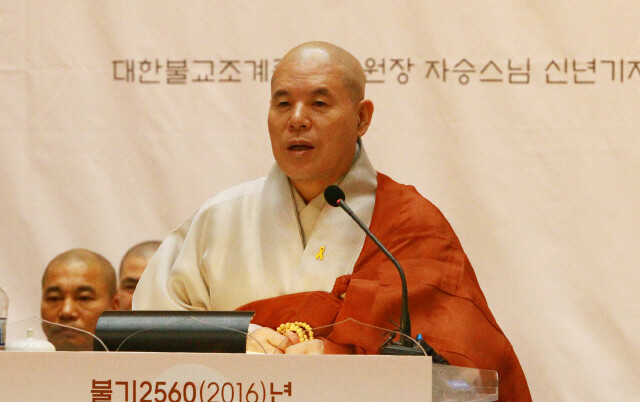hankyoreh
Links to other country sites 다른 나라 사이트 링크
Jogye Order of Buddhism to raise maximum age for ordination

As early as next year, the Jogye Order of Buddhism will be making it possible for older people to join the monastic life. Currently, the maximum age for ordination is 50 years old.
“We’re going to set up a special post-retirement monastic ordination system so that people who dream of living a life of religious discipline after retiring can join Buddhism,” said Ja-seung, President of the Jogye Order. Ja-seung made the comments during a New Year’s press conference held on Jan. 13 at the South Korean Buddhist History and Culture Museum, located in the Jongno District of Seoul.
“The rules of the order state that ordination can only take place until the age of 50. But people are living longer, and the social conditions have changed,” Ja-seung said. “We’re going to solicit people’s opinions with the goal of changing the rules during the meeting of the central committee in November of this year so that people who are well-suited for religious practice can be given new choices and opportunities.”
The maximum age for “going forth” - as becoming a monk or nun is called in Buddhism - was lowered from 60 to 50 in 1996, and then down to 40 in 2002, before being raised once again to 50 in 2006.
Currently, would-be monks and nuns must complete a basic monastic training program, which takes between six months and one year, and then study at a monastic university or a Zen center for four years before they can be officially ordained.
“We set up the post-retirement ordination system partly because Buddhism needs the expertise of retired professionals and partly because there are retirees who would like to join monastic life,” a representative for the Jogye Order said. “We’re going to make it possible for such people to become ordained through a relatively simple procedure.”
“The age limit on retirees being ordained through this special program will be between 65 and 70,” the representative also said.
While over 300 people used to enter Buddhist monastic life each year, the number has recently dropped to 200 or so.
“Our current labor committees will be expanded into social labor committees that deal with the environment, labor, human rights, and religious peace. We’ll also set up ‘hwajaeng’ networks on a regional level,” said Ja-seung. “Hwajaeng” is a Korean Buddhist approach to conflict resolution that means “cooperative resolution.”
By Lee Kil-woo, senior staff reporter
Please direct questions or comments to [english@hani.co.kr]

Editorial・opinion
![[Editorial] Does Yoon think the Korean public is wrong? [Editorial] Does Yoon think the Korean public is wrong?](https://flexible.img.hani.co.kr/flexible/normal/500/300/imgdb/original/2024/0417/8517133419684774.jpg) [Editorial] Does Yoon think the Korean public is wrong?
[Editorial] Does Yoon think the Korean public is wrong?![[Editorial] As it bolsters its alliance with US, Japan must be accountable for past [Editorial] As it bolsters its alliance with US, Japan must be accountable for past](https://flexible.img.hani.co.kr/flexible/normal/500/300/imgdb/original/2024/0417/6817133413968321.jpg) [Editorial] As it bolsters its alliance with US, Japan must be accountable for past
[Editorial] As it bolsters its alliance with US, Japan must be accountable for past- [Guest essay] Amending the Constitution is Yoon’s key to leaving office in public’s good graces
- [Editorial] 10 years on, lessons of Sewol tragedy must never be forgotten
- [Column] A death blow to Korea’s prosecutor politics
- [Correspondent’s column] The US and the end of Japanese pacifism
- [Guest essay] How Korea turned its trainee doctors into monsters
- [Guest essay] As someone who helped forge Seoul-Moscow ties, their status today troubles me
- [Editorial] Koreans sent a loud and clear message to Yoon
- [Column] In Korea’s midterm elections, it’s time for accountability
Most viewed articles
- 1[Column] The clock is ticking for Korea’s first lady
- 2[News analysis] After elections, prosecutorial reform will likely make legislative agenda
- 3Samsung barricades office as unionized workers strike for better conditions
- 4S. Korea, Japan reaffirm commitment to strengthening trilateral ties with US
- 5[Editorial] Does Yoon think the Korean public is wrong?
- 6‘Right direction’: After judgment day from voters, Yoon shrugs off calls for change
- 7Korea, Japan jointly vow response to FX volatility as currencies tumble
- 8[Editorial] When the choice is kids or career, Korea will never overcome birth rate woes
- 9Why Israel isn’t hitting Iran with immediate retaliation
- 10Strong dollar isn’t all that’s pushing won exchange rate into to 1,400 range